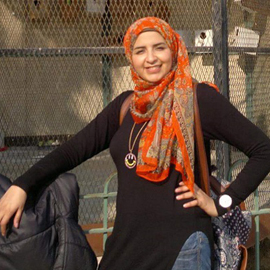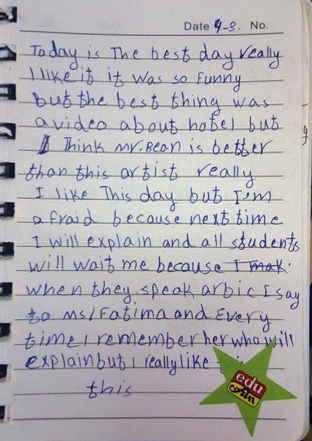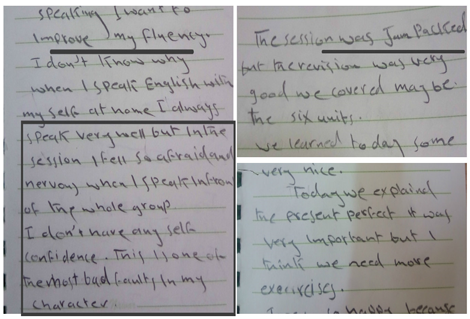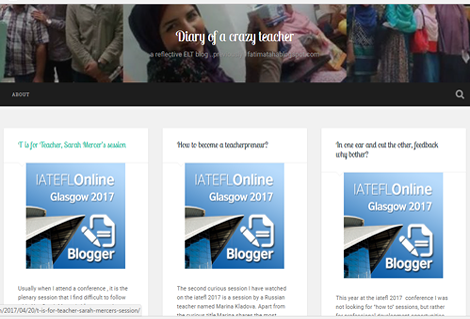Reflect a bit more, please?
 I have been an EFL teacher for almost 10 years now and have presented at a number of different International conferences. I am an IATEFL registered blogger as well as the British Council blogger. It is because I believe that teachers are the best ELT authors that I have started blogging. I wish to be able to share my in-class adventures and experimental practices with the rest of the ELT community, and what better platform to choose than MET magazine which I am a big fan and a follower of. I am currently working at Al Azhar English Training Centre, Al Azhar University, Egypt.
I have been an EFL teacher for almost 10 years now and have presented at a number of different International conferences. I am an IATEFL registered blogger as well as the British Council blogger. It is because I believe that teachers are the best ELT authors that I have started blogging. I wish to be able to share my in-class adventures and experimental practices with the rest of the ELT community, and what better platform to choose than MET magazine which I am a big fan and a follower of. I am currently working at Al Azhar English Training Centre, Al Azhar University, Egypt.
My mentors often complained that I did not write enough in my self- assessment reflection paper that we often fill in after each formal observation lesson. It was difficult for me to tell them that I simply did not know how!
Back inside my classroom, I myself asked my students to check some self-assessment “can do” statements that come at the end of a unit in most course books. And they never really answered these “can do” statements, for the same reason I never answered mine!
Self-assessment represented in reflection is a skill rarely practiced either by th e teachers or by the students. In this blog post, I share with you two of the tools, I use to help myself and my students to practice self-assessment.
Yet first let me start by sharing with you the definition of self- assessment. “Self-assessment is a process of formative assessment during which students reflect on and evaluate the quality of their work and their learning, judge the degree to which they reflect explicitly stated goals or criteria, identify strengths and weaknesses in their work, and revise accordingly.” (Andrade and Du: 2007, p.160)
To me the key words which I focused on applying with my students and myself are: reflections, formative assessment, evaluate work, stated goals, Identify weakness and strength. So, as I walk you through the self-assessment tools I used, you will see how to put these key words into action.
The first tool: Reflective Diaries
What:
They are small diaries or notebooks that both I and my students kept all through the academic year to write our own thoughts regarding the learning / teaching experience.
How:
First: At the beginning of the term I sat off to buy 10 small notebooks and wrote the word diary at the front.
Then: I introduced the idea of diaries through a short clip from the movie “Bridget Jones’s Diary” - mostly because I like the film!
After that: I shared with my student my new teacher’s journal and told them that, I too, was going to keep a diary just like they did.
The next step: was for my students to set three reasonable goals that they wish to reach by the end of the academic year. One of them just wanted to be able to write better!
By the end of each session we would all sit down for 10 minutes to think back to what had just happened. We mostly answered the questions in the table below.
| By the end of the session (Teachers) | By the end of the lesson (Students) |
|---|---|
| Did the lesson go according to plan? | How did I feel after the lesson? |
| What changed? Was it for the better? | What activities did I enjoy the most? |
| If I am to do it again, what would I change? | What activities did I enjoy the least? |
| Was there any situation that was left hanging? | Which part do I need to practice/research more? |
| How did I feel before/after the lesson? | Was there any situation/event that needs to be addressed? |
 I even gave them each a star that had the word Edu-fun on it and asked them to stick it on the diary entry where they thought they learned best. Every now and then, I would collect the diaries and go through their writings not to give language feedback but to have a better insight into their minds.
I even gave them each a star that had the word Edu-fun on it and asked them to stick it on the diary entry where they thought they learned best. Every now and then, I would collect the diaries and go through their writings not to give language feedback but to have a better insight into their minds.
Why:
Apart from the obvious reason that it is a powerful tool of reflection, that encourages problem solving, it also motivates students especially the shy ones to participate and take responsibility for their learning. It helps them to become more autonomous in the sense that they define their weaknesses and start seeking other resources to help them with their learning.
It also makes them feel appreciated when for example they would write down a suggestion of how to make something better through the lessons only to find me applying their suggested change the next session.
In my context, the intimacy of the idea of talking to their diary helped them assess not only their previous learning and plan for their future goals, but also to evaluate their feelings and to mention specific encounters that made them experience these feelings.

The second tool: Teacher Reflective Blog
As I mentioned earlier I did not practice much reflection hence did not know how to really assess my teaching, except for the comments I used to get at the end of an observed lesson which happened twice a year. Yet that was never enough for me to find out my strengths as well as to find my weaknesses. For it is easy for a teacher to always say “I am rubbish at this and that,” but not easy to say “I am good at this, let me practice a bit more to reach excellence.”
What:
It is an online blog I created more than 3 years ago. I started by writing my reflections on my teaching practices on a weekly basis. Then, I began to share my in-class experiments and any new activity that I created on the spur of the moment inside the classroom.
Now, I am an IATEFL registered blogger and the British council blogger as well.
How:
The process is quite simple really. If you have an email account, you sign up for wordpress.com or blgger.com, they are free unless you want a self-hosted website. There are of course other blogging services but these two are the best. It is up to you to decide the nature of your blog.
Consistency is the key. Allocate a certain time when you can sit and reflect back to what had happened after you taught your lesson. The best time is after you have finished your class while it is still in your head.

Why:
It is a useful reference for you to store your valuable lessons, ideas, tips and experiments.
Keeping a blog is paramount to your professional development. One day you are just thinking back to your class, another you are writing for a reputable ELT magazine. In time, you will have an audience as long as you stay committed.
To sum it up, no learning/teaching experience is complete until you reflect on it. Only then can you reach the maximum potential. Either you choose to use your pen or you fingertips; you need to reflect to be better able to assess your self.
References:
Andrade, H. & Du, Y. (2007). Student responses to criteria-referenced self-Assessment. Assessment and Evaluation in Higher Education, 32 (2), 159-181
Comments
Write a Comment
Comment Submitted